|
|
| 'Like' us on Facebook | Follow us: |
Posted on: Oct 30, 2014
Value of Vegetarianism
- Part 2
listen to the Sathsangs
The first part of this article focussed on the environmental, scientific and health reasons in favour of vegetarianism. Though such arguments are growing louder, one of the main reasons why vegetarianism remains a hard sell is humanity's long standing disbelief in the power of individual transformation to effect perceptible change. We often ask - what can my changing the source of my dietary protein do to set right various global crises? And why is vegetarianism suddenly trending as a cool topic when meat eating was not considered a threat to the sustenance of our planet a mere century ago?
A compelling case for non-vegetarianism is its nutritional value. If not from meat, where does one get the proteins from? In a discourse that Swami gave in during the 1990 Summer Course (21 May 1990) He answered this very question.
It is significant to note that those who live on vegetarian food are less prone to diseases whereas non-vegetarians are subject to more diseases. Why? Because animal food is incompatible with the needs of the human body. Doctors speak about proteins being present in non-vegetarian food, but the fact is that there are better quality proteins in food articles like vegetables, pulses, milk, curd, etc. Non-vegetarian food not only affects man’s body but also has deleterious effect on his mind. Food, Head, God - these three are interrelated.
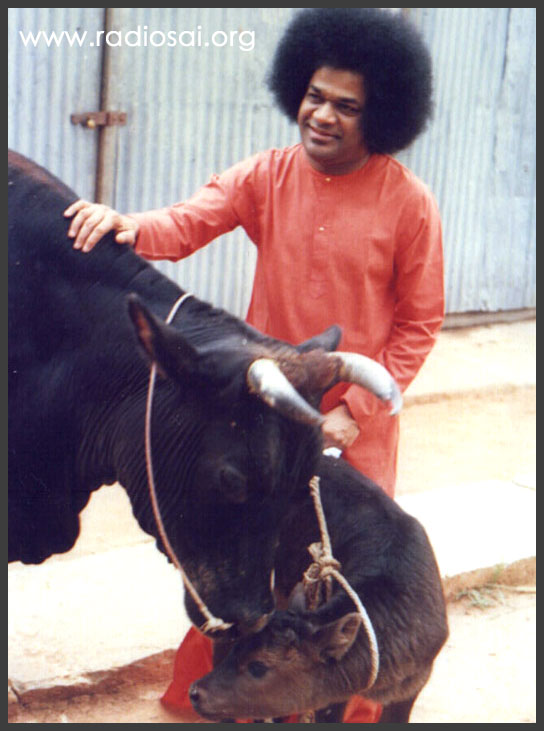 |
Why then is this misconception so strong, that animals are the only/best source of proteins and other such nutrients. In a sense this is due to our advances in technology. Earlier most people would eat what was available in their neighbourhood. Their diet would consist of vitamins and nutrients in the most easily accessible and locally available form. For instance in the US, those who lived in states that produced lentils depended on them for proteins. Those living in states that did not have the kind of weather and soil to produce lentils, turned to livestock for their proteins. The cattle ate the grass, produced proteins in their bodies, and people ate the cattle. But with the advent of the interstate railways and refrigeration, food could now travel across states. So now, the meat that was produced in say, down south Texas, could travel all the way to Washington, which is a lentil producing state. With time meat, which was an indirect source of protein used in places where there were no access to the right vegetation, became the best source of protein. And that has led to this appalling situation where in the year 2010, over 10 billion farm animals (bovines, goats, pigs, chickens etc.) were killed for food just in the United States.
To put that in perspective, the human population of the entire earth is about 7 billion, making US home to the annual murder of animals nearly one and a half times the entire human population, repeatedly, every single year. (This is not to single out the US, we are just making a point referring to them as numbers are available about the situation there.) Why didn’t lentils replace meat as a source of protein in the states that predominantly had grasslands? May be they just weren't ‘cool’ enough! But come to think of it, this same advancement in technology is what we must use to reverse this trend.
From fellow living beings to commodity – the journey of animal protein
What happens when this one region of a country, which had to produce meat for the population of that region, now has to produce for the demands of the entire country? The meat production must become more efficient. This demand for meat has lead to a drastic industrialisation of its production. With meat becoming a commodity, the industry and the consumers forget that we are talking about living beings that have feelings, sensations and an emotional existence, even if not as advanced as humans. In the process there is appalling disregard for their pain and discomfort.
While the world population has doubled between 1950 and 2000, our meat consumption has multiplied five times. When the demand for meat was far lesser, the meat came from small local farms. Since the numbers were smaller the conditions in which the livestock were raised were better and much less cramped than it is today. For an animal to become meat, it has to be killed. When a butcher in the early 19th century had to kill one bovine a day, he could take the care to kill it in a manner that would give it the fastest and least painful death. Can that be said about a factory where hundreds have to be killed in minutes? Also when we start seeing living animals as raw materials in a production line, we tend to care that much lesser for their living conditions and life itself. Consider this - when we as humans live an unhealthy life, eating the wrong kind of food and confined indoors most of the time, what happens? We become obese, unwanted fat accumulates under the skin and also in the blood vessels, thereby increasing the dangers of heart problems and the like. In other words we become overweight. Now what if you were a chicken or a cow? All that was said about poor health holds good, only the more fat you become more money you will fetch. Meat is priced by weight after all.
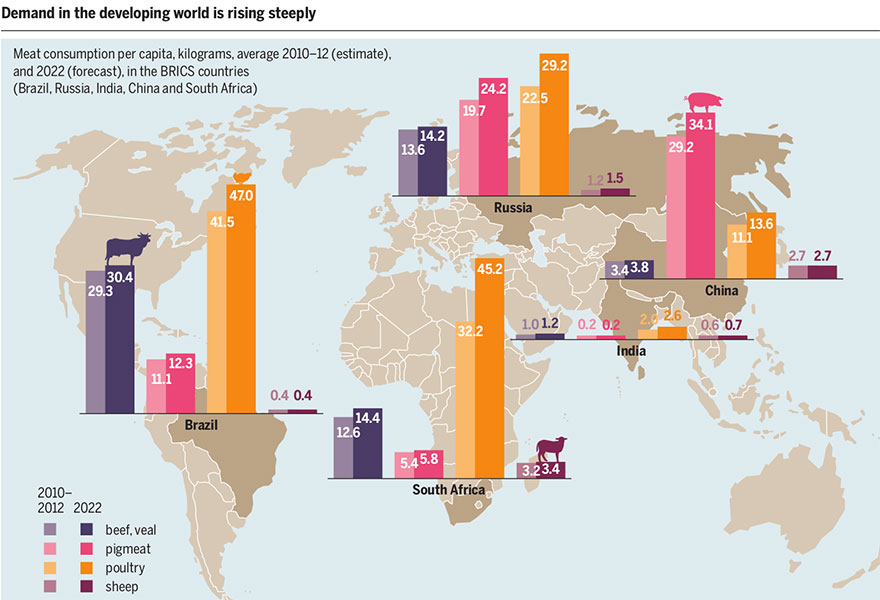 |
So an industry that is so obsessed with profits and could not care less about the comforts of these animals (after all they eventually ‘kill’ them) would be more than happy if they can provide them poor conditions to live, feed them food which is not their natural food and can get more money in return when they eventually grow unhealthily fat.
And that is exactly what they do! On one hand there is the high health risk for those consuming such animals, which has been discussed in detail in the previous part, but imagine the torture these animals are put to. Well, you don’t have to, for you can see for yourself. Sometime back PETA (People for the Ethical Treatment of Animals) ran a campaign aptly titled, ‘If Slaughterhouses had Glass Walls everyone would be Vegetarian.’ As part of that, a video was made with very disturbing visuals from slaughterhouses and the narration by the legendary British singer, Sir Paul McCartney. When we did the radio show on the theme of Vegetarianism, we had played just the audio of this documentary and we could say that the effect was indeed remarkable. At least one of our listeners completely stopped eating meat after this show, and attributed it mainly to the audio of this documentary. So we are presenting you this documentary and we must say that it is not for the weak at heart. But if you are weak at heart, but a strong in your non-vegetarian conviction, please do watch!
[Content Warning: The following contents may be disturbing to some viewers. Viewers’ discretion is strongly advised.]
Click here for the Video & Transcript (PETA website)
Survival of the cruellest – exploiting the voiceless
What right do we have as one among 8.4 million species as Swami says, to subject other living beings to such treatment? Is there any reason that can be worthy enough to justify this? Now imagine when someone says, “Oh but we need the protein and nutrients!” Picture this - You are walking down a lonely alley when a mugger pounces on you, assaults you and tries to take your wallet or purse. You try to resist, he injures you badly with a crude weapon and walks away with your money. If someone were to ask him, how could he ever do such a thing, and he answers, “But I need the money. I have to feed my children.” That’s exactly what we do when we subject these defenceless animals to cruelty, in the pretext of our nutritional needs.
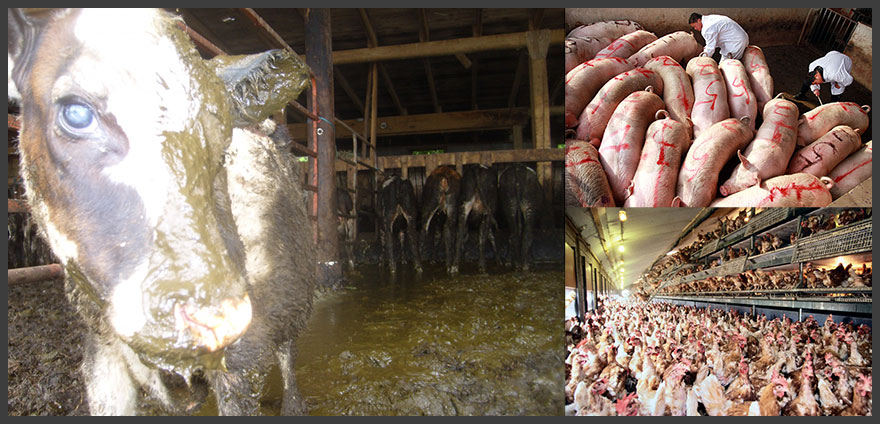 |
Whenever such points are raised, the human mind has always tried to counter it in its own crooked way. As we argued that most of the problem started with meat being produced in one region or country and travelling to another part, some have come up with a new solution. People turn to becoming locavore meat eaters. Locavores are people who ensure that the food they eat comes from within 100 miles of its point of purchase (this number may vary, but we guess you got the idea). So when locavores are non-vegetarians their meat comes from small local farms, where the animals are raised in far less cruel conditions. A good attempt at best but it still involves killing living beings to make food.
Rising above environment, economics and evolution
Even for the many environmental, medical and social reasons discussed earlier, champions of meat eating come up with counter practices and methods so they can continue to be non-vegetarians. On the environmental front, instead of curbing the raising of these farm animals for food, the meat lobby is looking to circumvent the issues at hand. Since farm animals are major contributors of greenhouse gasses such as carbon dioxide and methane, even more than all transport facilities combined, at the behest of the meat lobby, scientists are working on chemicals that can be added to the food of farm animals to reduce their belches and flatulence. Clearly, it is very difficult to deter the human mind from what it greeds for, for it will always come up with ways to justify it’s desires or make itself feel less guilty. That is why to become a vegetarian and to remain one all life, one needs reasons that go deep to the core of one's being and touch the moral and spiritual compass within.
On 20 November 1931, at a lecture delivered at the London Vegetarian Society, Mahatma Gandhi made a crucial observation when he said:
“I discovered that for remaining staunch to vegetarianism a man requires a moral basis. For me that was a great discovery in my search after truth. At an early age, in the course of my experiments, I found that a selfish basis would not serve the purpose of taking a man higher and higher along the paths of evolution. What was required was an altruistic purpose.”
Gandhi further explained that one may heap innumerable reasons favouring vegetarianism for health, environment or economy citing pollution and expense involved in maintaining non-vegetarian food habits. But all these are selfish reasons according to him. And because they are selfish, they are frail and are easily overrun. And that is exactly what is happening with most people. One of the points Gandhi makes in the talk is that most Indians are vegetarians, but a good number of them remain so because it is not economically viable to be meat eaters (remember this is 1930s). He states that if this be the reason for their vegetarianism, they will turn tables when they become richer. Prophetic words indeed as this news report suggests: ‘Many Indians turning to meat as their wallets grow fatter’. So unless the desire to become or remain a vegetarian comes from a moral purpose, it is unlikely to survive science and market forces.
Murder a day keeps good karma away
 |
Bhagawan Baba says that the essence of all scriptures, of all religions and times can be summed up in the words, ‘Help Ever Hurt Never’. He exhorts us to be of help to those around us, or at least cause least harm and injury, even if we are unable to help. This moral lesson is the very basis of why one must be a vegetarian. How can I subsist at the cost of another life? How can I relish a food that is got by putting someone through torturous pain and agony? It is the desire to live with this self-satisfaction that their life and existence is not harming any being, which is leading thousands of people to embrace vegetarianism and even veganism.
One may raise arguments even to counter this stance. Don’t plants have life? Hasn’t it been proven through scientific research that they too can feel pain? (The work of Jagdish Chandra Bose is a monumental effort in that regard.) But Bhagawan gives a simple explanation for that. He says, that the reason the pain that plants feel is not comparable to that felt by animals is because plants do not have a central nervous system. In animals the injury inflicted upon one part of the body is transmitted as pain to the brain, through the central nervous system. This does not happen in plants. Also many of the vegetables and fruits that we consume can be got without killing the plant altogether. Apple picking for instance does not kill the apple tree. So for anyone wishing to live life causing least harm to beings around, a life that does not sustain itself on cruelty, the answer leads to the 'V' word.
The Power of Spiritual Compulsion
The discussion so far applies to any individual, whatever be their life goal and aspirations. What about those interested in a spiritual life, desiring to make the most of this precious opportunity to attain a higher goal? Bhagawan says, “Jantunam nara janma durlabham - To be born a human is itself rare and precious”. If so, there must be a purpose for which this boon has been granted to us. So human birth as to be looked upon as a precious means to achieve something higher and grander rather than an end in itself. And Bhagawan also reiterates that we must shed the delusion that we are just the body. When we believe that we are not the body, it is important to consider what the food does to us and not just our bodies! During the discourse Bhagawan delivered at a Cardiovascular conference held in Puttaparthi (7 Feb 1993), He said:
“Many doctors emphasise the value of proteins and recommend meat, eggs etc. But proteins got in this form serve only to build the body and do considerable harm to the mind. Doctors are primarily concerned with the gross physical body. They pay little attention to the subtle form of the mental makeup. Most of the diseases that are prevalent in the world today are related to the mind. Mental illnesses seem to outnumber physical ailments”.
Bhagawan had further explained this important concept about the food we intake, during the 1993 Summer course in Indian Culture and Spirituality too. He said:
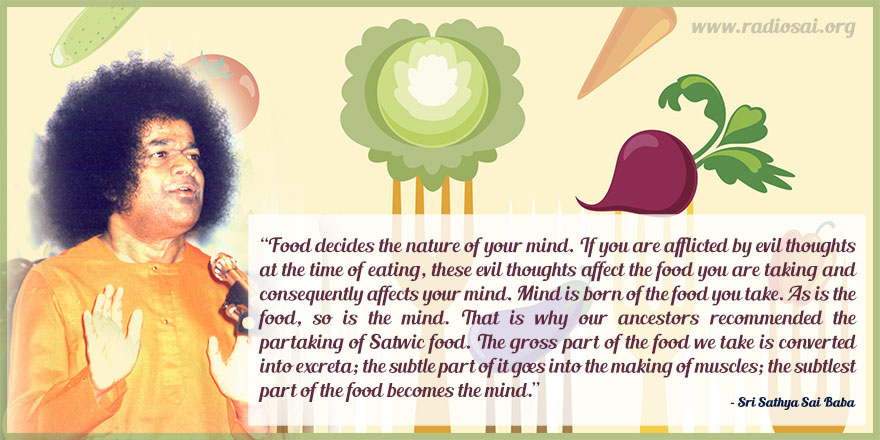 |
This is the reason why Swami would often say that it is important to entertain good noble thoughts when one cooks food. Because that is what forms the subtlest part of the food, the emotions involved, the manner in which the materials were gathered - righteous or otherwise, and also the thoughts one thinks while eating the food. What relevance does this have to non-vegetarian food, and how does this affect the human mind? Swami explains that even as the proteins and nutrients nourish the body and muscle, the pain, the fear and agony the animal undergoes during its torturous life on the farm and especially at the time of its slaughter forms the subtlest part of the food which feed the mind. When the goal of all spiritual practices is the purification and sublimation of the mind or the attainment of chitta shuddhi, how utterly counterproductive it is to partake of food that can affect it further! Not only are we inflicting indescribable misery on innocent creature, but by eating their meat we also take into our minds the feelings of insecurity and pain.
How Little a Burden is Your Existence?
In the Yoga Sutras Patanjali speaks of the eight-fold path (Ashtanga Yoga) leading to realisation. The first of which is Yama, a certain code of conduct or self-restraint that an individual must observe before being worthy of receiving higher knowledge. Yama again consists of five limbs - Ahimsa (non-violence), Satya (adherence to Truth), Asteya (refrain from stealing), Brahmacharya (celibacy during the pursuit of education) and Aparigraha (non-appropriation or not seeking gifts or favours). The first and foremost point is Ahimsa or not harming another being; how then can one who claims to have taken to the spiritual path or claims oneself a devotee resort to violence for one’s food? One may claim that they are not involved in the process of killing (an argument many a non-vegetarians resort to), but we saw what animals are put through in slaughterhouses. Would that happen if there is no consumer? Even though not directly, how can one wash one’s hands off the Himsa that is happening for one’s sake? The last of the yamas, Aparigraha is often spoken of as not accepting gifts from anyone.
The idea behind this discipline is that one’s dependence on those around must be kept at the minimum. For, all give and take results in a certain amount of bondage and for anyone who wishes to break free of the bondages of worldly life, accepting or anticipating of gifts and favours would be detrimental. This is also a reason why one must turn to vegetarianism. Our existence should cost our surroundings and beings around, the least possible. As a figure we quoted earlier, if a nation of 300 million people consumes 10 billion farm animals, what is the cost of one individuals sustenance? If you are a non-vegetarian consider the number of lives that have to be lost to feed just you, in your lifetime! This has to be considered by every individual, more so by a person who has turned to or considering a spiritual path. Asteya is refrain from stealing. So it is wrong to accept what is given as gift as much as it is wrong to take away by force or stealth. Here too the bondage that occurs when one takes from the other, binds the individual further. This holds good whether what is being taken is money and material, or proteins and nutrients!
Though one might argue that this holds good only for spiritual aspirants, one must understand that everyone at some point will turn to spirituality for answers to existential questions. And as Swami says, when one becomes more spiritual, the imaginary line that divides spirituality from worldly matters slowly fades away. So the above do not necessarily apply only to those who have a spiritual bent of mind, but to all.
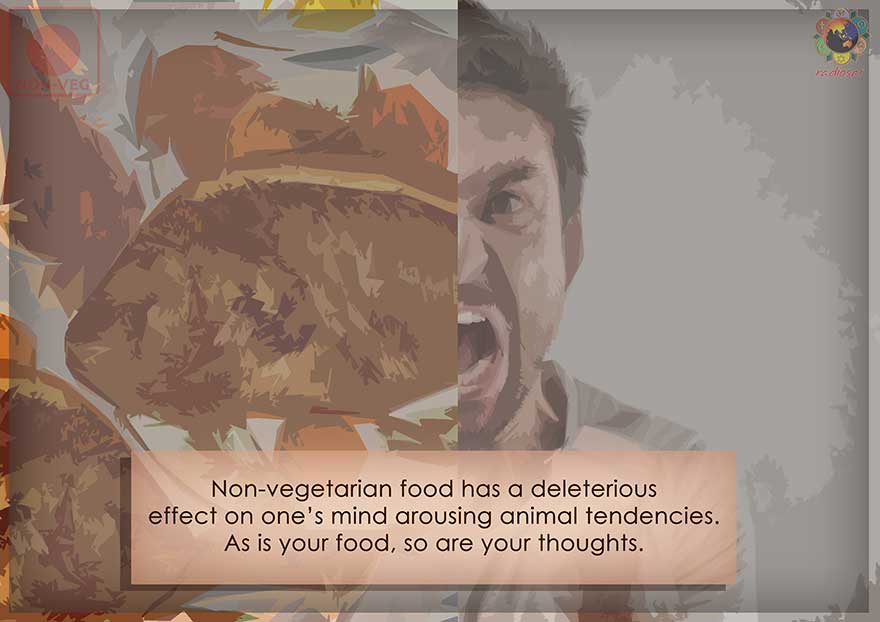 |
The lasting and deeper effect of meat eating on the human race
Many of the arguments we have placed before our readers in this article are based on scientific or statistical study and are empirically verifiable. But any command that Bhagawan gives will have its reasons spread over different dimensions and not all can be understood by reason or experimentation. Swami gave one such subtle and profound reason during the Summer Course of 1977. Swami has spoken on many occasions about the importance of the thought one has just at the moment of giving up one’s life. If we contemplate on the Divine all through our life, we will then think of God at the moment of death, for when one thinks of God at that moment, he or she merges in God. What happens when an animal is slaughtered? What are its last thoughts and what happens as a result? Swami had said in the discourse mentioned:
“It is my duty to convey to you the truth as it exists. Today, the reason why the human population is increasing is because of the attitude of the people. For man to eke out his living, to fill a small tummy of his, God has created plenty in the world. God has created a large amount of rice, fruits, wheat etc. While such good food has been created by God, yet we go and eat meat and fish. And all these fish (and other living beings) which we kill and eat are reborn as human beings. Thus, if we enquire in some depth into these things, we will realise that whatever the nature of that material may be, the divinity that is contained in man can transform that material into another human being.”
Swami had said something quite similar even during the Summer Course in 1974:
“For the purpose of feeding ourselves, many lives are being sacrificed. In this process of our searching for food, many things like trees, birds, fish and animals are being sacrificed. Because these various living things are being sacrificed and are merging with human beings, they have also been acquiring human lives in their rebirth. None of these Jivas are getting any chance of rising higher than human lives. The entire life is being spent in making an effort to be reborn after one's death, thus repeating the cycle of birth and death.”
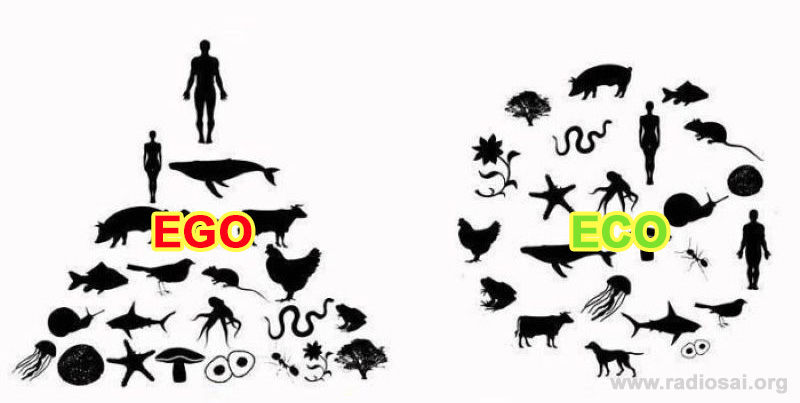 |
In essence Swami said that when animals are killed for food by man, these life forms obtain a human birth without going through the evolutionary process. This means more humans are born with an animal nature, explaining the collective involution of human consciousness as reflected in rising crimes, hate and violence. Also if we consider the emotion with which these animals give up their life, which is fear of humans, when born again as human beings, they are born with the same fear and distrust towards their fellow beings. And this to an extent explains the growing hostility in the human society.
Once Bhagawan explained, one may catch a cat and feed it Satvic food over a period of time (in an attempt to change its eating habits), but the moment the cat sees a mouse, it will pounce and run after it! This is because, He explained, there is only an extent to which you can change the nature of an animal. At some point, its true nature will surface. He further explained, but humans are not like that. Though born into a family of non-vegetarians, one can through self-effort change one's habits, and this is what distinguishes a man from an animal. And it is this inbuilt ability we all must harness to change our ways so as to make ourselves worthy of receiving what we all have undertaken this journey for.
Holy Grail for Sai Devotees
Though by means of this article, we have tried to present, through various angles the value of vegetarianism, these are quite redundant for Sai devotees. For members of the Sai family, there is only one reason, sufficient and conclusive, to be vegetarians - Swami wants us to be vegetarians. As Gandhi said, the reason must be more than scientific, dietary or even environmental. It should be moral and selfless. We at Radio Sai, during the preparation of this programme and article came across innumerable people - friends, colleagues and devotees who had effortlessly given up meat eating, and were never tempted to slip thereafter. They had no knowledge of all these arguments we have placed before you in the two parts of this article. They did not need it one bit! It was because they did it for Swami, for the love of Swami and there can be no reason more unassailable than that. And for His part Swami was ever ready to provide the encouragement and inspiration from within and without to those who wished to take this one step. A case in point is the experience of Dr. Mohan, the internationally renowned diabetologist and convener of the Sri Sathya Sai Trust in Tamil Nadu whom Swami encouraged and rewarded for turning vegetarian.
In 2007, all of a sudden the Convener of the Sathya Sai Trust, Tamil Nadu, Mr. G. K. Raman passed away in the Sai Kulwant Hall, during Darshan time on Onam day (about which you can read here). This left the important post of the Convener vacant. The members of the trust requested Swami to appoint another person to the post. Swami said He would but He did not name anyone right away. About a couple of months later, Dr. Mohan, who was one of the members of that trust, was returning after a trip to Prasanthi Nilayam. He had picked a book from the bookstore to give him company on his journey back home. While he was reading it, (which was interestingly a compilation of Bhagawan’s discourses on food) he came across this statement: “I have done so many things for you. All your wishes I have fulfilled. In return I have asked you for one thing - to become a vegetarian, and you have not done so. And you give an excuse saying there’s not enough proteins in vegetarian food [which was exactly the reason Dr Mohan would give for continuing to be a non-vegetarian]. I entirely disagree with you; protein is found in many vegetarian foods like…”, Swami then went on to list vegetarian food items that are rich in proteins. This startled him, for it was as if Swami was addressing him directly, point blank. He made up his mind immediately to give up eating meat. He duly conveyed it to his wife on reaching home. She too was delighted to join him in this endeavour to please Swami.
Just a few days after he had made this resolve, he got a call from the All India President of the Sathya Sai Organisation, Mr. Srinivasan. He was speaking in whispers as he conveyed the news that Swami had chosen him to be the convener, and that Swami had asked him to find out from Dr. Mohan if he was willing to take it up. Mr. Srinivasan explained that he had stepped out of the interview room to make this call, and he had to report to Swami Dr. Mohan’s reply. Dr. Mohan accepted the offer, but it was later that he reflected upon the sequence of events. He explained, that Swami would’ve chosen him as the convener that very day the post had become vacant, or in fact even much before. Swami does not have to ponder over, or weigh options like us. But Swami waited till Dr. Mohan made this resolve to become a vegetarian. May be to reward him for taking that step, or may be it was necessary for him to be further purified before he accepts this noble responsibility. Either ways, it speaks of the importance Swami gave to being a vegetarian, especially for those living and/or serving in His name. If our lives have to now become His message, then it is time to examine our every life style choice.
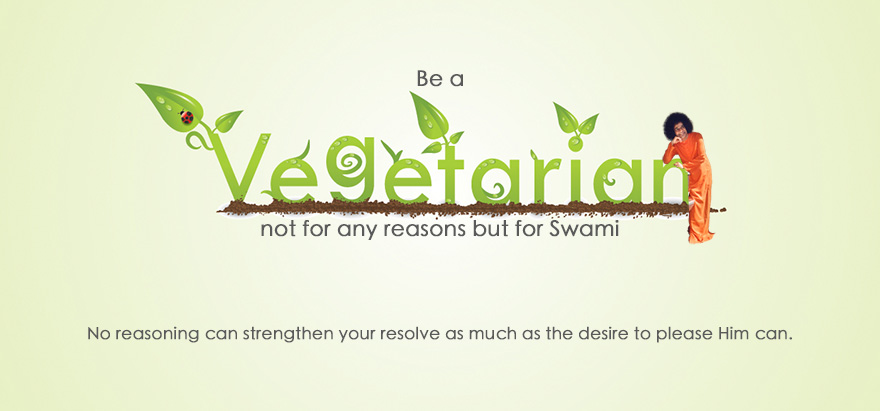 |
Another such story of encouragement we recollect at this point is the story of Ms. Jeroo Captain, whose short narration we had carried as an article, ‘Becoming a Veggie’. It is indeed an interesting account and quite unique.
Dear reader, if you too are a person who has successfully turned a vegetarian, please share your account in the comments section below. The way you handled this transformation could be an inspiration or guidance for someone else!
Swami has given us many instructions regarding food, and His message in this regard goes way beyond this simple categorization of vegetarian and non-vegetarian food. In fact Swami reminds us that all that we take in, through all our senses should be considered as food. That makes the discipline in food all the more complex and deep. Why then such fuss about vegetarianism? Are all vegetarians angels and infallible, or are all non-vegetarians despicable in character and behaviour? Definitely not, and we would discourage any vegetarian from trying to occupy that mantle of moral high-ground. One needs to be a vegetarian because that seems to be, as mathematicians would say, ‘A necessary condition, but not a sufficient one.’ It is a good place to begin! For Swami Himself has said on many many occasions that He wants His devotees to necessarily abstain from consuming alcohol, smoking and eating meat. And for those still struggling to quit this habit, let's take that first step, firmly assured that Swami will encourage and reward us to stick to this resolve. Be a vegetarian not for any of the reasons mentioned in this article. Do it because Swami always expects it of His children, and no reasoning can strengthen your resolve as much as this desire to please Him can. Even as you do it, realise that never before has being a vegetarian been so charitable, humanitarian, moral and essential.
What do you think about this article? Please let us know by writing in to h2h@radiosai.org. Do not forget to mention your name and country.









